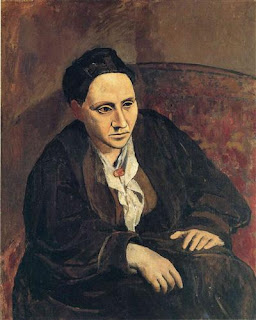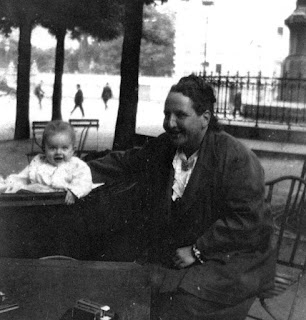“I was born in San Francisco, California.”
Gertrude Stein was a Jewish-American writer who lived in France for over 40 years, becoming an intrinsic part of the Parisian art world in the early 1900s. Part of an avant garde artistic movement that thumbed its nose at past artistic structure, she was intimate with artists, both painters and writers, such as Pablo Picasso, Henri Matisse, Juan Gris, George Braque, Guillaume Appolonaire, Henri Rousseau, Ernest Hemingway, Mildred Aldrich and many others, who were frequent visitors to her 27 rue de Fleurus location. She attempted her own literary movement, writing many works that were deemed “incomprehensible”, but received a small following. Her autobiography is perhaps a more gentle exposure to her “art”.
 |
| Portrait of Gertrude Stein (1906) Pablo Picasso source Wikiart |
Although Stein presents this biography as being about her longtime companion, Alice B. Toklas, in fact it is Stein, speaking with the voice of Toklas about her own life and experiences. She briefly chronicles her early life, then moves directly to France, going into great detail about her life there, yet revealing little about herself. Her style is mostly observation and there is little depth to her words. It is a matter of, “this happened, and that happened, and this happened,” without there being much of an internal interaction with occurrences, or an outward reaction to them. The book was all about Stein, but on the other hand it wasn’t, and I never felt that I came to know much about the woman at all. Of course, I now know about all the important people she knew and all about her writings, but it’s more like skating on top of a lake instead of diving right into it; you see a reflection that has echoes of reality, but somehow reality itself escapes you.
Nevertheless the book had some interesting information on the artists living in Paris during Stein’s residence there:
“The Matisses had had a hard time. Matisse had come to Paris as a young man to study pharmacy. His people were small grain merchants in the north of France. He had become interested in painting, had begun copying the Poussins at the Louvre and become a painter fairly without the consent of his people who however continued to allow him the very small monthly sum he had had as a student …..”
And interesting things to say about different nationalities:
Americans and Spaniards
“Americans, so Gertrude Stein says, are like spaniards, they are abstract and cruel. They are not brutal, they are cruel. They have no close contact with the earth such as most europeans have. Their materialism is not the materialism of existence, of possession, it is the materialism of action and abstraction. And so cubism is spanish …..”
Germans
“Gertrude Stein used to get furious when the english all talked about german organization. She used to insist that the germans had no organisation, they had method but no organisation. Don’t you understand the difference, she used to say angrily, any two americans, any twenty americans, any millions of americans can organise themselves to do something but germans cannot organise themselves to do anything, they can formulate a method and this method can be put upon them but that isn’t organisation. The germans, she used to insist, are not modern, they are a backward people who have had a method of what we conceive as organisation, can’t you see. They cannot therefore possibly win this war because they are not modern.”
French
“The french are so accustomed to revolutions, they have had so many, that when anything happens they immediately think and say, revolution. Indeed Gertrude Stein once said rather impatiently to some french soldiers when they said something about a revolution, you are silly, you have had one perfectly good revolution and several not quite so good ones; for an intelligent people it seem to me foolish to be always thinking of repeating yourselves. They looked very sheepish and said, bien sur mademoiselle, in other words, sure you’re right….”
There is always an underlying humour touched with a seriousness in her narrative; although life is somber business, one must not take it too seriously.
 |
| Stein with Ernest Hemingway’s son, Jack (1924) source Wikipedia |
Stein definitely has both fans and critics. One enthusiast, Mabel Dodge, an American art patron, wrote, “In Gertrude Stein’s writing every word lives, apart from concept, it is so rhythmical and cadenced that if we read it aloud and receive it as pure sound, it is like a kind of sensuous music.”
However, Stein’s brother, who apparently had the eye of an art connoisseur and amassed an impressive collection of paintings, called the biography “a farrago of lies,” Hemingway declared it, “a damned pitiful book,” and critic F.W. Dupree denounced “Steinese” as being “gnomic, repetitive, illogical, sparsely punctuated …… a scandal and a delight, lending itself equally to derisory parody and fierce denunciation.”
Perhaps the truth lies in the battlefield between the two factions, and American writer Sherwood Anderson, found the median between the two, saying, “As for Stein, I do not think her too important. I do think she had an important thing to do, not for the public, but for the artist who happens to work with words for his material.”
 |
| Stein’s signature |




It is a shame that there was no depth in the book. She lived in an interesting time with interesting people and would have heard/seen/been part of history…a little bit of more intuitive narration would have made it better!
This was such a good review. Very intriguing. I like how you describe her autobiography – a gentle exposure to her (attempted) "art."
I noticed that you come away feeling like you could not know her deeply b/c she did not reveal very much about herself; and I felt like I could define what she was like with the little scrapings that she did share. When I listen to her reading her poem, I feel like, "Yep. That's her," an emotionless, stoic pillar – like the busty bronze that was made for her in Paris.
I wish I kept the quote a different writer made about her. It was very telling, as it was all about Gertrude. Maybe if I find it, I will pass it on to you.
The book is interesting, but in a shallow sort of way. If you focus on information, it's somewhat engaging. But if you focus on Stein, it's disappointing. It was as if she was trying too hard. I also got the impression that she was trying to be deliberately flamboyant, but in a more intellectual and artsy way. I did like the way she spoke her mind, but again, you wonder ….. it's the first time I wondered at the reliability of the narrator concerning an autobiography. It was a weird feeling.
Thanks, Ruth. I know what you mean about being (somewhat) able to define her but I still feel like you would be guessing. She's obviously a big woman, so we think "imposing" and "outspoken", but it's a guess. However, you are right that some of her words back that assumption up, and she obviously had a ….. I was going to say respect, but perhaps a better word is fascination from the artistic community. In this book, I felt that her words were for show or for some ulterior purpose, never focusing on herself. Yes, certainly, some of "her" were in them, but you never get a good view …. like I mentioned, a reflection. I did think she had insight, as you can see from her quotes, but again it was never directed at herself.
Yes, I'd love to hear the quote you found. I liked the one by Anderson, as I think it accurately described her role in the avant garde movement. As for Stein as a person, I think you could find out more about her by reading what other people wrote, than from Stein herself.
Great review and enjoy following your discussion with Ruth about the book. Sometimes books that never will cross my reading list are intresting….and I can learn about them from those like you who take the time to read them. Bravo to you AND Ruth! ps love the word 'farrago' !
Discussions are so illuminating, aren't they? And I've had some good ones to start off the year! I must admit that I'm a little leery of the upcoming biographies (except for Merton, Lewis & Solzhenitsyn) but Ruth is positive so I'll perhaps steal some positivity from her. I hope it works! 😉
This comment has been removed by a blog administrator.
Thanks for an interesting post! As much as I enjoy Stein's time period, I don't know much about her art or writing. I am mainly familiar with her quote "You are all a lost generation" that Hemingway included at the beginning of The Sun Also Rises.
Hemingway and Stein were good friends, at least according to Stein, so I was surprised at his reaction to this biography. At least he was an honest friend. 😉 I'll have to look for that quote, if I ever attempt that book again; it almost put me off Hemingway for good, but that was years ago. I hope to have a different reaction with a re-read.
Great review! I had a really hard time with Stein in school, especially Tender Buttons, so I never went back to her work in my own reading. Maybe some day I'll give her another go. I don't know though 🙂
I assume that her biography would easier reading than her other works. Just a guess. 😉 She appears to be very impressed with herself, which comes across in her work. It's too bad because I prefer it when the author allows his/her work to speak for itself. However, I think she was probably quite a character, but one that came across better in person than on the page.